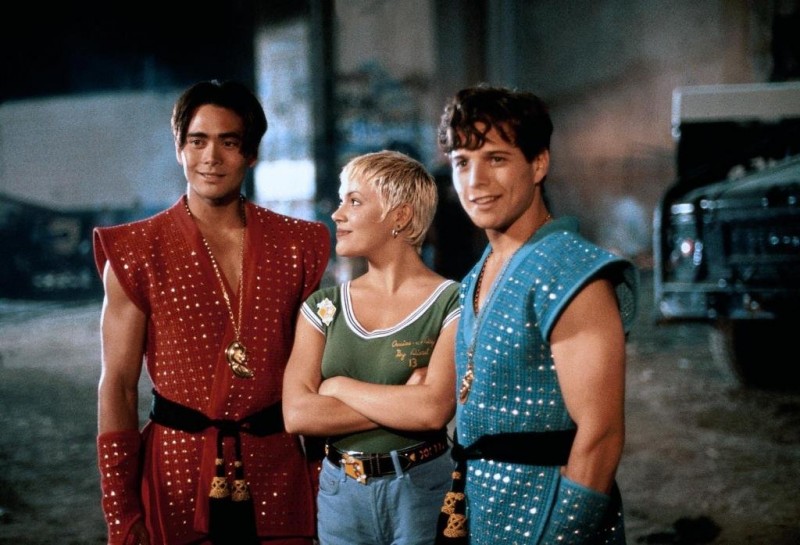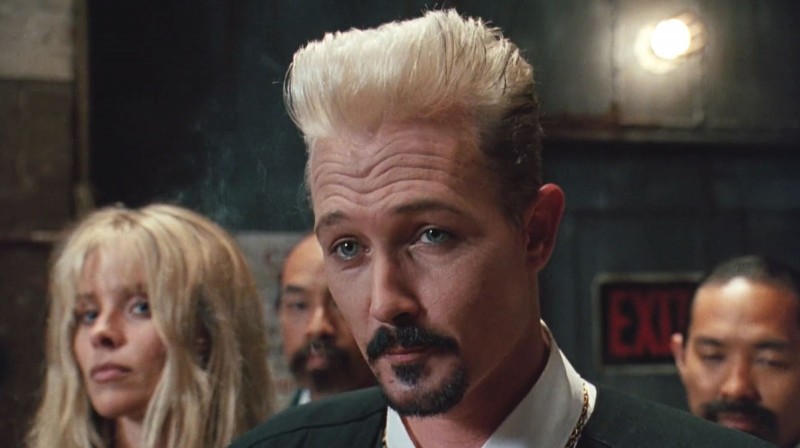Double Dragon was a phenomenon when it hit arcades in the late ’80s. Light on story and big on martial-arts combat, it tasked a pair of brothers with saving a damsel in distress, eventually forcing them to turn on each other. The game inhaled quarters and received numerous ports to home consoles, and at some point, its film rights were purchased. Even with a group of promising writers, the film didn’t turn out well due to an inexperienced director and a collection of producers who didn’t know what they wanted.
This article originally appeared abridged in the February 2019 issue of Game Informer. The movie also released on Blu-ray for the first time last month.
Scott Wolf (left) and Mark Dacascos (right) played brothers Billy and Jimmy Lee respectively. “It was pretty weird to explain why we had an asian guy who was brothers with a guy who didn’t look Asian at all,” director James Yukich says
Double Dragon the movie released in 1994 and takes place in the far-flung future of 2007. It imagines an apocalyptic Los Angeles ravaged by earthquakes where the cops control the day and gangs based on assorted themes like “clowns” or “the postal service” rule the night. Robert Patrick, only a few years removed from his memorable turn as the T-1000 in Terminator 2, plays Koga Shuko – a villain obsessed with recovering the second half of a powerful ancient Chinese talisman which grants incredible magical powers. Martial artist brothers Billy (Scott Wolf) and Jimmy Lee (Mark Dacascos) must protect the talisman, teaming up with progressive gang leader Marian (Alyssa Milano) in order to keep it out of Shuko’s hands. Despite the popularity of the source material, the film was a huge flop. Its Rotten Tomatoes score sits at an abysmal eight percent, and box office estimates point to a gross of $2.3 million… on a $7.8 million budget.
[embedded content]
James Yukich was not a first-time director when he agreed to make Double Dragon, but it was his first time directing a feature film. Before that he had mostly directed TV, music videos, and assorted concert films. “I very rarely ever think about the film at this point – for any number of reasons,” Yukich says with a laugh.
Despite the poor critical and commercial reception of the film, the talent associated with it is impressive. The original script was written by Paul Dini, who later worked on Batman: The Animated Series and is the co-creator of Harley Quinn. Yukich took Dini’s script and brought in Michal Davis and Peter Gould to expand on it. Davis wrote and directed 2007’s Shoot ’em Up and Gould would later become a producer on Breaking Bad and Better Call Saul. Mark Brazil, who would co-create That ’70s Show a few years later, took a final pass on the script to punch up and improve the dialogue. “All three writing teams were excellent,” Yukich says, “It’s hard to believe how it came out.” Even on the production side of things you can find impressive names like Tom Karnowski, who was recently an executive producer on Star Wars: The Last Jedi, and the special-effects team worked on movies like Die Hard and future Marvel titles.

Alyssa Milano’s character Marian (center) is arguably the strongest and most interesting character in the movie
Yukich liked working with the producers on the film, the Shah brothers and old friend Alan Schechter, who pushed him to direct, but he just couldn’t get everyone on the same page. “You have to have one unified direction or it’s not going to make sense, and we didn’t really have one unified direction,” Yukich says. “I love those guys and I think they were all fantastic, but they each had their own visions, and couldn’t agree on it. I blame myself a lot for not going and saying, ‘Hey, we’ve got to do it like this.’” In retrospect, Yukich regrets not taking a stronger stance for what he believed the film should have been. “I wish I had the experience and knowledge I do now back then.”
Along with the myriad producers butting heads, there was also the complete absence of anyone related to the original property. “Never talked to them at all,” Yukich says. They offered no direction or feedback on the completed film.
Yukich’s biggest regret is related to the film’s rating. In Yukich’s mind, he was making a fun, kung-fu movie for kids. When it came back with a PG-13 rating, he was surprised, but the producers made no effort to change it. “There was really nothing in it that should have made it more than PG,” Yukich says. “That caused an incredible amount of problems in terms of kids not being able to go see the film. It’s a kid’s film!”
The movie has no blood, no true injuries, and features some very light sexual innuendo, which Yukich says he would have been happy to cut in order to acquire a PG rating, but he was never given the opportunity. Some of the producers had always intended that the movie be a cool, violent kung-fu movie. “As soon as I read the script and saw what was going on, I thought, ‘This is a kid’s movie. This could be a great kid’s movie,’” Yukich says, and that’s the movie he attempted to make. “As an adult watching the movie, I would have thought, ‘This is the worst action movie I have ever seen!’”

Robert Patrick is best known for playing the T-1000 in Terminator 2: Judgment Day. He, strangely, also has a shape-shifting powers Double Dragon
Even before the film was complete, production had its own challenges. A union issue shut down shooting for a month, and perhaps worst of all, was the director of photography. “The problem with Tony [Mitchell] was that he injured his back literally the second day of shooting,” Yukich says. Mitchell had shot Duran Duran music videos and Tom Petty’s “Don’t Come Around Here No More,” making him a promising addition, but he lost his balance holding a Steadicam and crashed down a hill. They tried to keep him on, even resorting to placing him on a gurney and pushing him alongside a wheeled cart holding a monitor, so he could track action shots. It just wasn’t working, so they brought in a new DP, Gary B. Kibbe. Yukich says Kibbe was great, but he was the wrong fit for an action movie.
The film crew also ran into an issue while shooting the big river explosion scene. Yukich says the public was not informed of what was going to be happening. “We had permits and everything was legal, but they probably should have done an announcement in the newspapers,” he says. “I think they thought too many people would gather around.” The scene was shot in Cleveland on the Cuyahoga River, which had caught fire a few years earlier related to pollution. “When we blew up the river there was a huge explosion and everyone in the nearby office buildings thought it was real. They thought the river blew up,” Yukich says.
Overall, Yukich has fond memories of making the movie. Outside of the arguing producers, the cast and crew members had a good time, but the reception was still rough. “Oh yeah, I thought it was pretty disappointing,” Yukich says. After all, he didn’t get to make the film he wanted to make. “I think part of it’s my fault, though, because I didn’t stand up enough. It was my first film. I didn’t know the politics.”
Before we reached out to him, Yukich had not thought about the film in some time. He says the last time he remembers watching it was five years ago, catching it on cable. “I look at it now, and I am way happier with it now than I was then,” Yukich says. “It’s not as bad as I remember it being.”
The film also strangely found an audience outside of the United States. “It’s very big in Guam,” Yukich says. During college, Yukich’s son met someone from the country and when they found out their father directed Double Dragon, they got very excited and requested signed memorabilia, which Yukich was happy to share.
“I would love to be able to go back and do it again. I think it could have been really good,” Yukich says. “There were all kinds of problems along the way, but I look back on it now and think, ‘What an interesting, funny kids’ movie,’ and it’s a shame they didn’t see it when it came out.”
To read a feature that looks at the shortcomings and legacy of the Super Mario Bros. movie, head here.
